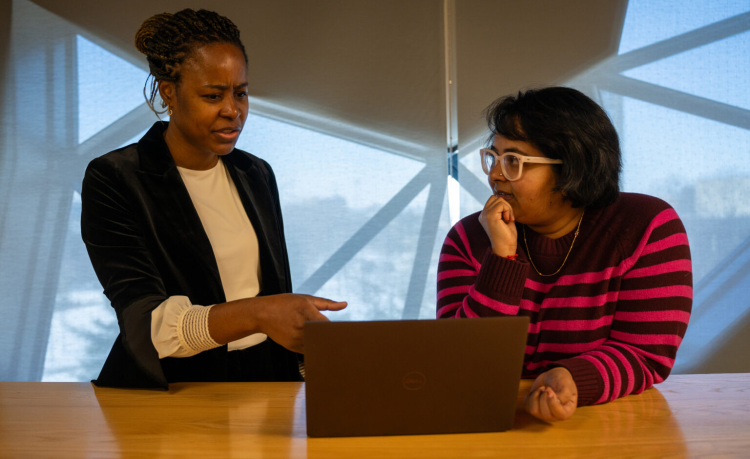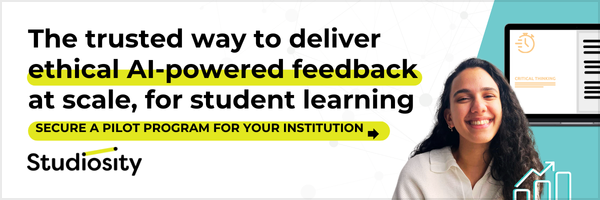Alvine Boaye Belle, an assistant professor at York University's Lassonde School of Engineering, is working to break down systemic barriers for under-represented students pursuing STEM studies through her recent appointment as a mentor for the Indigenous and Black Engineering and Technology (IBET) PhD project.
Designed to reduce barriers in higher learning for Black and Indigenous PhD students pursuing doctoral degrees in engineering and technology, IBET offers financial assistance of $30,000 annually for four years, along with invaluable mentorship from researchers and professors. Since its inception, the program has grown significantly, now spanning more than 18 universities and involving dozens of mentors.

Professor Alvine Boaye Belle with grad student Mithila Sivakumar
"As a partner in the IBET project, Lassonde is dedicated to supporting decolonizing, equity, diversity and inclusion (DEDI) in STEM, actively serving as an ally and working toward creating more inclusive academic and industry environments," says Lassonde Dean Jane Goodyer.
Understanding the challenge for under-represented students is what inspired Belle, who holds a PhD in software engineering, to become involved.
"I've faced obstacles such as difficulty getting papers accepted and receiving proper recognition for my work. These struggles have made me stronger and wiser, but I don't want others to experience the same issues; I want to help prepare the next generation of successful Black and Indigenous leaders in STEM. It's important for Black and Indigenous students to become aware of potential barriers, and make sure they are equipped to tackle them throughout their academic and professional journeys."
The IBET project fosters an inclusive community and a network of support, and through mentors like Belle, works to increase the presence of Black and Indigenous academics by providing research environments, fellowships and mentorship opportunities
"When students see mentors who look like them, it makes success feel possible, even in the face of challenges," she explains. "Being part of a supportive community also helps eliminate feelings of isolation and fosters a sense of belonging."
As a Black researcher and professor, Belle brings valuable personal experience of navigating challenges in academia, while showcasing her expertise through cutting-edge research in artificial intelligence (AI).
Her work focuses on the intersection of generative AI, safety assurance, autonomous systems and DEDI in computing. She has recently explored the use of large language models like GPT-4 to automate software engineering processes. Specifically, Belle and her team in the Department of Electrical Engineering & Computer Science have been developing methods to automate the creation of safety cases - critical documents used to verify the safety, reliability and functionality of various systems.
Traditionally, safety cases are manually created - a process that is time-consuming and prone to human error. By leveraging large language models, Belle's research aims to improve both the accuracy and efficiency of safety cases, enhancing software development processes and the overall safety of technology across various sectors such as health care and automotive industries. This work is important for ensuring the reliability of systems to prevent malfunctions that could result in environmental damage, financial loss or injury.
Her recent research, supported by her former graduate student, Mithila Sivakumar, has already provided valuable insights into the capabilities of GPT-4 in generating moderately accurate safety cases, offering a baseline for future work.
Yet, despite her groundbreaking efforts, Belle has faced many of the challenges common among minorities in academia and industry.
"It's rare to find Black and Indigenous researchers in leadership positions," she says. "There's a glass ceiling that can limit our ability to contribute to society and advance economically. I've often felt powerless when my intelligence and abilities have been questioned, and these barriers have prevented me from receiving recognition or securing collaborations."
As an IBET mentor, Belle is deeply committed to helping students overcome the systemic obstacles she has faced, and aims to guide the next generation of Black and Indigenous leaders in academia and industry. Through her involvement in the IBET program, she is helping to shape a future where diversity is the new standard.
"STEM environments should reflect the diversity of the world around us," she says. "When you bring diverse perspectives together, you foster higher creativity and innovation. In fields like AI, diversity is critical to ensuring fairness. Many AI systems are discriminatory because they don't account for diverse voices. We need more diversity in leadership positions to make these systems fair and equitable."
"Professor Belle's journey as a Black scholar has not only made her more resilient but also more determined," says Goodyer. "With the support of Lassonde and through her position as an IBET mentor, she is well-equipped to guide the next generation of engineers and researchers toward success, helping them break down the barriers that stand in their way."
This story was originally featured in YFile, York University's community newsletter.










